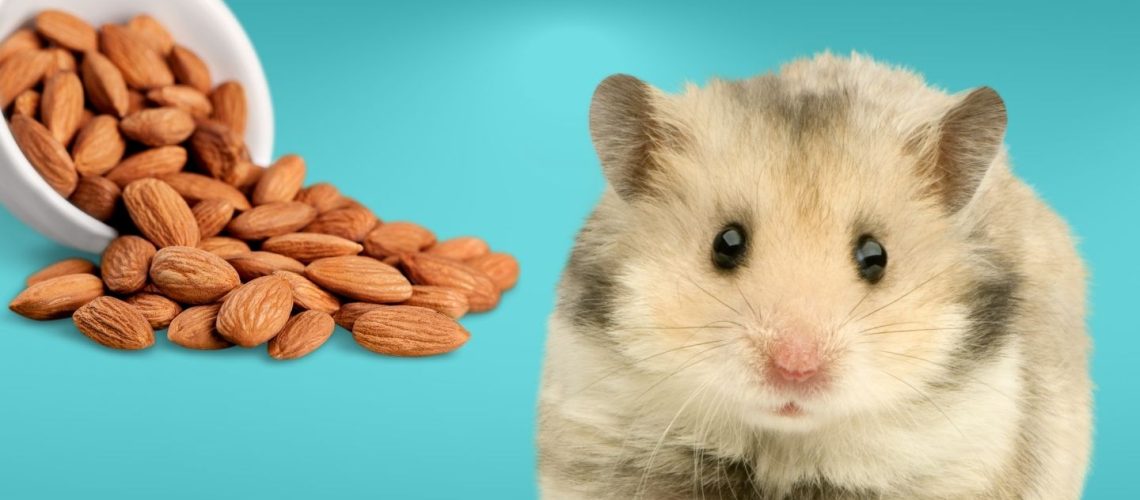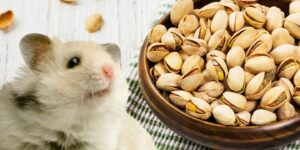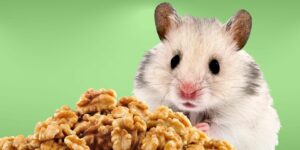Yes, hamsters can eat almonds in small amounts as a treat. Providing a balanced diet for your pet hamster is crucial for their overall health, and almonds can be a nutritious addition. This article explores the nutritional benefits, serving size, and potential risks of feeding almonds to hamsters, as well as alternative treats and the importance of consulting with a veterinarian.
Nutritional Benefits of Almonds for Hamsters
Almonds are a valuable source of essential nutrients for hamsters, including:
Protein content
One of the key nutritional benefits of almonds is their high protein content, which is vital for muscle growth and maintenance in hamsters.
Healthy fats (monounsaturated and polyunsaturated fats)
Almonds contain healthy fats that are important for maintaining overall health, energy levels, and a shiny coat.
Vitamin E and antioxidants
These nutrients found in almonds contribute to a healthy immune system and protect cells from oxidative damage.
Minerals (calcium, magnesium, potassium)
Almonds are rich in minerals that are essential for maintaining strong bones and teeth, muscle function, and overall health.
Preparing Almonds for Hamsters
Before feeding almonds to your hamster, ensure they are prepared properly to prevent potential health issues:
Removing the shell
Almond shells can be difficult for hamsters to digest, so remove the shell before offering them to your pet.
Chopping or grinding almonds into smaller pieces
Breaking almonds into smaller pieces can make it easier for your hamster to eat and prevent choking hazards.
Mixing with other safe fruits, vegetables, or seeds
Almonds can be combined with other hamster-safe foods to add variety and additional nutrients to their diet.
Signs of Overfeeding Almonds
Offering too many almonds to your hamster can lead to adverse health effects. Watch for these signs indicating overfeeding:
Weight gain
Excessive almond consumption can cause your hamster to gain weight, potentially leading to obesity and related health issues.
Diarrhea or constipation
An imbalanced diet with too many almonds may disrupt your hamster's digestive system.
Lethargy
Changes in energy levels can indicate that your hamster is consuming too many high-calorie treats, such as almonds.
Changes in coat appearance
A dull, brittle, or greasy coat may be a sign of an imbalanced diet that includes too many almonds.
Alternatives to Almonds for Hamster Treats
If you want to diversify your hamster's treat options, consider these alternatives:
Other nuts (e.g. walnuts, hazelnuts, pecans)
These nuts provide similar nutritional benefits as almonds, but remember to offer them in moderation.
Fresh fruits (e.g. apple, blueberries, strawberries)
Hamsters enjoy a variety of fruits, which can be an excellent source of vitamins, antioxidants, and fiber.
Fresh vegetables (e.g. broccoli, carrot, spinach)
Vegetables are another healthy treat option, providing essential nutrients and hydration.
Commercial hamster treats (e.g. seed mix, yogurt drops)
These products are specifically formulated for hamster nutrition, but be sure to choose high-quality options without added sugar or unnecessary additives.
Monitoring Your Hamster's Diet
Maintaining a balanced diet for your hamster is vital for their health:
Importance of a balanced diet
A balanced diet ensures your hamster receives all necessary nutrients for optimal health and energy levels.
Regular weight checks
Monitoring your hamster's weight can help you determine if adjustments are needed in their diet.
Observing behavior and overall health
Keep a close eye on any changes in your hamster's behavior or appearance that may indicate dietary issues.
Consult with a Veterinarian
When it comes to your hamster's diet, it's always best to seek professional advice:
Importance of professional advice on hamster nutrition
A veterinarian can provide guidance on the best dietary choices for your hamster, including the appropriate inclusion of almonds.
Addressing specific dietary needs or health concerns
Your hamster may have unique nutritional requirements or health concerns that can be addressed by your veterinarian.
Tips for maintaining a healthy diet for your hamster
A veterinarian can share valuable advice for monitoring your hamster's diet and ensuring their ongoing health.
In conclusion, feeding almonds to your hamster can be a nutritious treat in moderation. Be sure to monitor their intake, consider alternative treat options, and consult with a veterinarian for guidance on maintaining a healthy, balanced diet.







